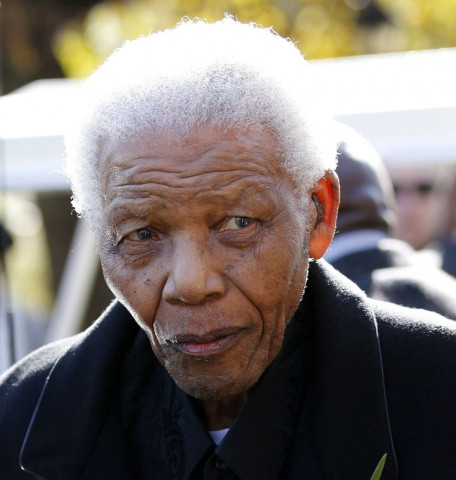Mandela responding well to treatment for lung infection
News eased days of speculation about the health of the aging statesman being treated in a Pretoria military hospital.

"Doctors have concluded the tests, and these have revealed a recurrence of a previous lung infection, for which Madiba is receiving appropriate treatment, and he is responding to the treatment," said a statement from President Jacob Zuma's office.
The news eased days of speculation about the health of the aging statesman being treated in a Pretoria military hospital.
But medical experts warned that for a 94-year-old, any hint of an infection can be serious.
Mandela's wife Graca Machel admitted it was painful to see him growing more frail.
"I mean, this spirit and this sparkle, you see that somehow it's fading," she told eNews Channel Africa in an interview filmed Monday.
"To see him aging, it's something also which pains you. You understand and you know it has to happen," she said.
Chest infections are among the most common problems seen in elderly patients but "in people of extreme age (it) is always a potentially concerning factor," said Mark Sonderup, vice chairman of the South African Medical Association.
And for Mandela to be hospitalised means he is suffering from something that is "more than just the simple cough."
The former president who led South Africa to democracy has had longstanding lung problems.
He was previously hospitalised for an acute respiratory infection in January 2011, when he was kept as an inpatient for two nights. He was released in a stable condition for home-based care and intense medical monitoring.
While serving his 27-year prison term under the apartheid regime, Mandela was diagnosed with early stage tuberculosis in 1988 after being admitted to hospital in Stellenbosch with a bad cough and weakness and having complained of dampness in his cell.
Two litres of fluid were drained from his chest and he spent six weeks recuperating in the hospital before being transferred to a private clinic near his mainland Cape Town prison where he was the facility's first black patient.
The latest scare became public on Saturday when Mandela was flown from his rural home village of Qunu to a military hospital where he had to undergo tests which the authorities said were common for people of his age.
Government officials have sought to calm fears around his health saying he does not face immediate danger.
But amid sketchy details of his condition, many South Africans have resigned themselves to the idea that the nation's first black president will not be around for ever.
Mandela's grand-daughter Ndileka told local television that the man affectionately known by South Africans as Madiba has taken to accept his condition.
"I think he takes it in his strides, he has come to accept that it's part of growing old, and it's part of humanity as such. At some point you will dependent on someone else, he has come to embrace it," she said.
Over a decade after he left office the tall grey-haired Nobel peace laureate retains a prominent place in the national psyche, and his health has become a subject of global obsession as he ages.



















COMMENTS
Comments are moderated and generally will be posted if they are on-topic and not abusive.
For more information, please see our Comments FAQ